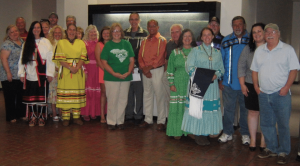9th Native American Tribe Recognized by State of South Carolina
June 25, 2015COLUMBIA, SC – The South Carolina Commission for Minority Affairs Board of Commissioners officially granted State Recognition to the PAIA-Lower Eastern Cherokee Nation of SC making them South Carolina’s 9th State Recognized Tribe on Friday, June 23, 2015.
Members of the PAIA-Lower Eastern Cherokee Nation of SC, supporters, and the public attending the SC Commission for Minority Affairs Board meeting, witnessed history when the Board voted to officially recognized the “Tribe”.
The Tribe submitted their approximately 600 page petition in September 2014 to the SC Commission for Minority Affairs after several attempts over the last few years. The petition was reviewed by the State Recognition Committee and was given a favorable report by the Committee in December 2014. The report was reviewed by the Board of Commissioners of the SC Commission for Minority Affairs and accepted in March 2015. The SC Commission for Minority Affairs Native American Affairs staff conducted a site visit and verification of enrolled members culminating in a second report to the Board of Commissioners. Based upon the two favorable reports, the Board voted to grant “Tribal” status to the PAIA-Lower Eastern Cherokee Nation of SC on behalf of the State of South Carolina.
The PAIA-Lower Eastern Cherokee Nation of SC has a documented history dating back to first contact with Europeans, sharing history with Tribes throughout the Southeast. The PAIA-Lower Eastern Cherokee Nation of SC has deep roots in the traditional Cherokee homelands and lower villages located in the following counties: Oconee, Pickens, Anderson, Greenville, Spartanburg, Cherokee, Union, Laurens, Abbeville, Newberry, Greenwood, McCormick, Edgefield and Saluda. Their history, which includes the Indian Removal Act (Trail of Tears), ceding of lands to colonists, wars and hidden identities, has been well documented. The descendants of the Cherokee in the upstate of South Carolina have continued to remain a core community hiding traditions and customs within daily community life and hiding their identities as Indian by identifying themselves or being identified as “White” and “Mulatto” after Indian Removal in the Southeast.
In their petition, they document their Native American Ancestors through historical records like the Census and outline of history in their communities for over 100 continuous years until modern day. They attend events with other tribal communities and they have a well known presence statewide and regionally since the early 1980’s as an organized group—chartered with the Secretary of State’s Office on April 24, 1984. They were recognized by the State of South Carolina as a Native American Indian “Group” in 2006, and were previously acknowledged 1986 by Governor Riley in an Executive Order as one of four existing Indian entities in the State of South Carolina at that time.
Since 2005, the State of South Carolina has officially recognized Native American entities through the SC Commission for Minority Affairs. There are currently one Federally Recognized tribe; nine State Recognized “Tribes”; four State Recognized “Groups”; and two State Recognized “Special Interest Organizations”. There are large numbers of urban Indian and non-recognized Indian people in South Carolina as well. There are approximately 43,000+ Native American Indian people living in South Carolina according to the 2010 Census Data.
The South Carolina Commission for Minority Affairs-Native American Affairs Initiative serves as the State’s official Native American Affairs agency working with Native American Indians to address issues of poverty and socio-economic deprivation through collaboration with government and private partners. The Native American Affairs Initiative’s mission is to establish the framework to ensure social equity and economic prosperity for all Native American Indian citizens throughout the State of South Carolina through policy change, education, and increased awareness. Our vision is that all Native American citizens of South Carolina and their communities will be treated equitably and see economic prosperity through recognition, policy changes, collaboration, educational initiatives, and increased public awareness of the significant contributions that Native Americans have made to South Carolina’s rich cultural heritage.














